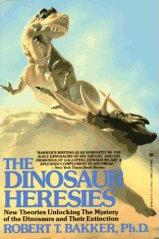
The Dinosaur Heresies
Rober T. Bakker
481 pages, including notes and index
published in 1986
It's not often that I say this, especially about a science book, but I love The Dinosaur Heresies. I first read it back when I was fourteen or fifteen, when I got it from the library, finding it browsing the new science books, as you do as a young nerd. It blew my mind. Here I had a well written book that calmly changed everything I knew about dinosaurs, but that was just the start. It also changed the way I looked at science in general. Let me explain.
I always was a science geek, in the broadest sense of the world, but the thing is that as a layperson and especially as a child, you get a very distorted view of quote unquote, The Scientific Process. At school and in many popular science books, again especially aimed at children, the history of science is presented as now largely completed progression of discoveries and inventions, presented without the context in which these discoveries were made. The march of science is presented as an orderly, steady process, in which science moves ever onward from ignorance into an ever greater and more complete understanding of life, the universe and everything.
And then I read The Dinosaur Heresies and for the first time I am told that not only is this a simplified view of how science progresses, but that it is possible for scienctific understanding to not just stagnate, but to even degrade over time. Because that's basically what Bakker is saying in this book. His thesis in The Dinosaur Heresies is that the orthodox view of dinosaurs as cold blooded, reptillian dullards, an evolutionary deadend is wrong, that rather dinosaurs were one of the most succesful groups of land animals in history, as warmblooded and active as mammals are today. To me, this seemed a radical, novel idea, but what Bakker quickly makes clear is that this is not a new view at all, but one that was the dominant view from the time of the first discoveries of dinosaurs up until the 1920ties. Yet this correct view is replaced for several generations, from the 1920ties to the 1960ties by the absurd idea that the dinosaurs were somewhat of a failure. Unfortunately Bakker does not attempt to explain how this could've happened, since his focus here is to provide the case for his theory of warmblooded dinosaurs rather than talk about the history of dinosaur paleontology.
Bakker lays out his case in a calm, methological manner. He first examines the orthodox theory, showing where its deficiencies are, showing the evidence against the theory. He does this by not only looking at the dinosaurs themselves, but also at reptiles alive today, comparing them to each other and showing where they differ. Once he has established that the old theory has serious defects, he goes on to examine where dinosaurs lived and what they lived on, again to show, in more detail, the error of the cold blooded theory and the idea that plant eaters like Brontosaurus lived off mushy waterplants. If dinosaurs were coldblooded, they needed much less food than if they were warmblooded; Bakker shows that dinosaurs could eat and probably did eat as much as mammals of a similar size.
He then goes on to the way dinosaurs moved and lived, examining the interaction between planteaters and predators and how an arms race developed several times in dinosaur history between armoured planteaters and ever nastier predators; with the former relying on an active, warmblood style defense rather than a coldblooded "wait it out" defense. It is in this part of the book that we also get to hear about the tantalising possibility that one branch of dinosaurs never died out...
It's at this point that Bakker looks at the direct evidence for warmbloodedness in dinosaurs, by looking at their sex lives, by their fast rates of growth from hatchling or newborn dinobaby to adult size and the ratio of predators to prey, all of which indicate that dinosaurs were warmblooded.
Finally, Bakker puts dinosaurs into their new context, quickly sketching their rise and fall, with the interesting thing being that he does not believe in the idea that the dinosaurs died out due to a meteor impact, an idea that has been largely confirmed since then. He ends the book by argueing that dinosaurs deserve to be taken out of the class Reptillia into their own class, Dinosauria, with birds as one branch of it, the sole surviving dinosaurs. (An idea that made me look quite differently at my dad's chickens at the time...)
What The Dinosaur Heresies proposes has now become the new orthodox view of dinosaurs and there are newer, more up to date books pushing this view now available, so should you still read this? My answer, obviously, is yes. This book laid the foundation for this revolution in dinosaur paleontology, it is still largely correct and it is highly readable and lucid, one of those books that actually make you feel smarter for having read it. And the icing of the cake are the illustrations, all done by Bakker himself, both proper drawings and sketches, the latter of which show some incredibly cute looking dinosaurs...
Read more about:
Robert T. Bakker,
The Dinosaur Heresies,
dinosaurs,
science,
book review
